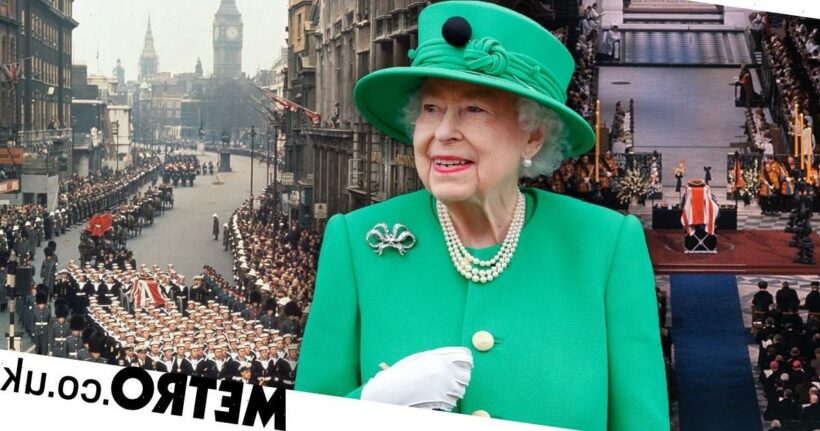Rainy Pathé film still exists showing King George V’s coffin being loaded from a special train at Paddington station before its journey to Windsor Castle on a grey January morning in 1936.
Mourners, including his widow, Queen Mary, his sister Queen Maud of Norway and King Boris of Bulgaria, were captured in the footage – the first taken at the funeral of a monarch.
The death of his son, King George V1 in 1952, became the first funeral of a British monarch to be broadcast on television – an event that saw a huge spike of sales in TV sets.
The fact that it was televised at all was made possible because the BBC had acquired 100 redundant military transmitters at the end of the war and engineers had recently converted them for sound and picture transmissions.
Cameras were excluded from the funeral itself but the new Queen gave permission for them to be allowed into Westminster Abbey to transmit her Coronation, on June 2, 1953, live to the nation.
In preparation for its biggest broadcast ever, the BBC chose its 30 smallest cameramen to squeeze into nooks at the abbey, particularly above the organ loft. Around 27 million subjects watched from home on their new black-and-white TVs, with a further 11 million listening on radios.
Now – 70 years later – the Queen’s state funeral will become the biggest broadcasting event ever.
‘It is unprecedented, the world has not seen a funeral like this,’ says London Mayor Sadiq Khan.
A funeral like no other requires coverage like no other – and, over the past 11 days, the world’s media have descended on the capital. Within minutes of the news of Queen Elizabeth’s declining health on September 8, there was, according to one industry insider, ‘an immediate scramble for live positions at Balmoral’.
Queen Elizabeth II dead: Latest updates
- Live tracker shows how long the queue is to see Queen lying in state
- What happens next following the death of the Queen?
- What time is the Queen’s funeral and where is it taking place?
- Nationwide minute’s silence for The Queen at 8pm on Sunday
- Drivers told ‘avoid central London’ with major road closures for Queen’s funeral
Head to Metro.co.uk’s Queen Elizabeth II tag page for the latest updates, and sign Metro.co.uk’s book of condolence to Her Majesty here.
Then, dozens of open-sided white media tents began popping up in front of Buckingham Palace, organised for the likes of the BBC, Sky News and CNN, and hurriedly filled with lights, cameras and people. Next came the generators and satellite trucks to facilitate live broadcasts along with ‘thousands of miles worth of cables, hundreds of thousands of metres of duct tape and not enough toilet facilities,’ as one observer on the ground put it to me.
Almost as soon as the BBC’s Huw Edwards broke the news to the world, news anchors from around the globe were hurriedly accredited and booked on the next available flights to London. And here they have remained, for what promises to be one of the most moving and memorable events ever broadcast.
Her Majesty’s funeral tomorrow, which is being broadcast live on TV worldwide and streamed on a variety of international platforms, will garner a huge global audience.
The last state funeral in the UK was that of Winston Churchill in January, 1965. The occasion, at St Paul’s Cathedral, was attended by dignitaries from 112 countries including Queen Elizabeth, Dwight D Eisenhower and Charles de Gaulle, and followed by a staggering 350 million people around the world on TV and radio.
Tomorrow’s truly global event will see CNN, NBC and Fox News running blanket coverage, and CBC in Canada, ABC in Australia, TF1 in France and Germany’s SAT 1 also broadcasting, as are channels in India and Africa.
‘Whenever something of this massive scale happens, whether it’s a death, a natural disaster, a declaration of war, news takes priority over all programming,’ Aline Pivot, head of news at France’s TF1, told Yahoo.
‘Many of our viewers are big fans of the British royal family and are very interested in the coverage, so SAT 1 will also broadcast the funeral service live from Westminster Abbey,’ added Michael Ulich, vice president of news, sports, factual and fiction at Germany’s SevenOne network.
It’s also boom time for the capital’s hotels. Around Westminster, suites and hotel rooms with balconies offering views have been snapped up by broadcasters as a base from which to anchor their coverage.
‘This will be a funeral like no other, or few others,’ John Kampfner, director of the UK in the World Initiative at Chatham House told Politico. ‘There have been great state funerals before – of US presidents, Nelson Mandela’s. But, quite simply, the Queen was the most famous person in the world, and as a result I think there will be an attendance list that will be unprecedented.’
He’s right. World leaders including Joe Biden, Emmanuel Macron, Justin Trudeau and Jacinda Ardern will be among the 2,000 VIPs at the funeral, joined by European royalty, Japan’s emperor and controversial statesmen such as Brazil’s Jair Bolsonaro.
‘I have to be seen to be believed,’ was a famous refrain for the late Queen and one, it seems, that remains true, even on her final journey.
Source: Read Full Article


